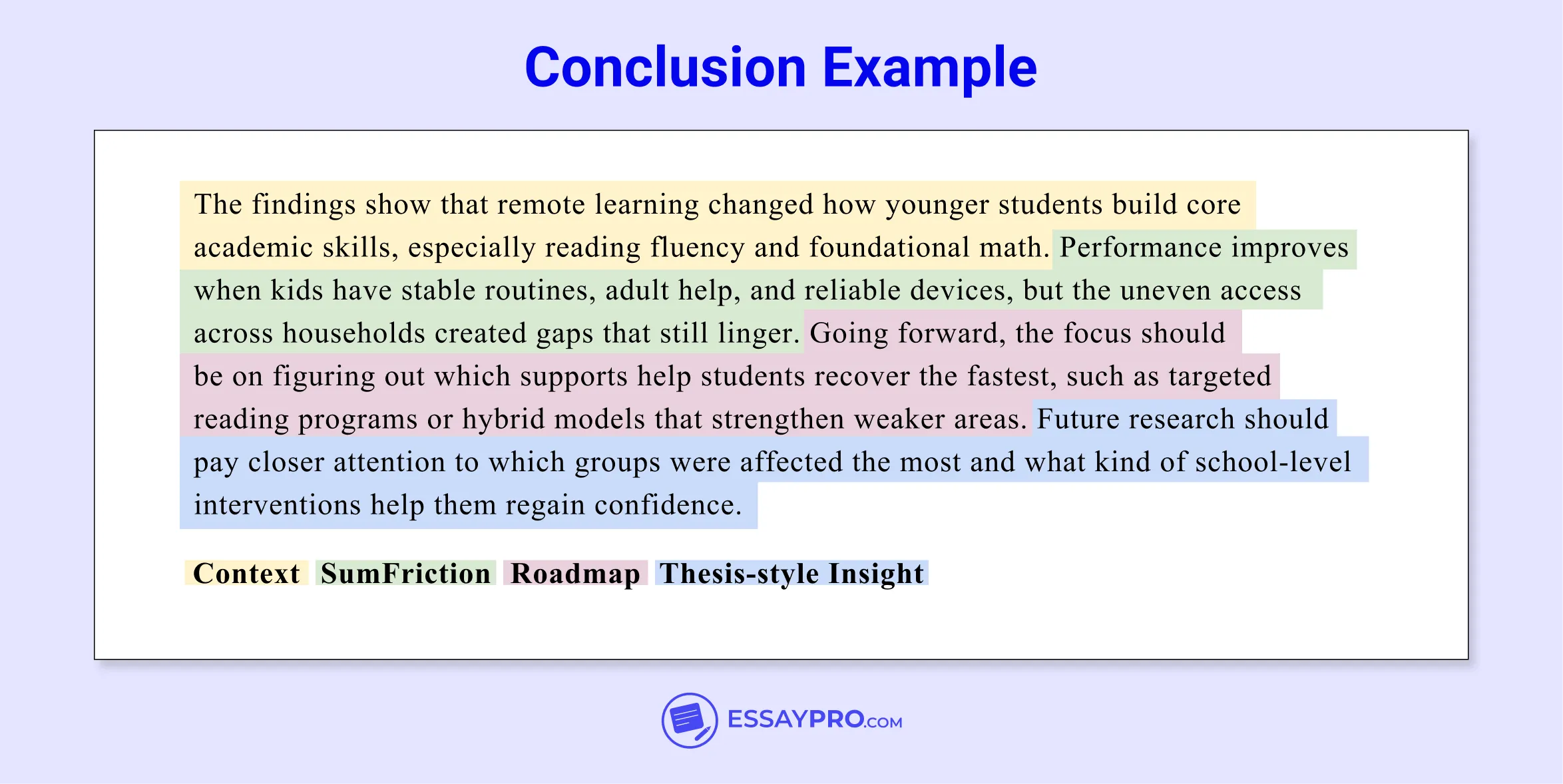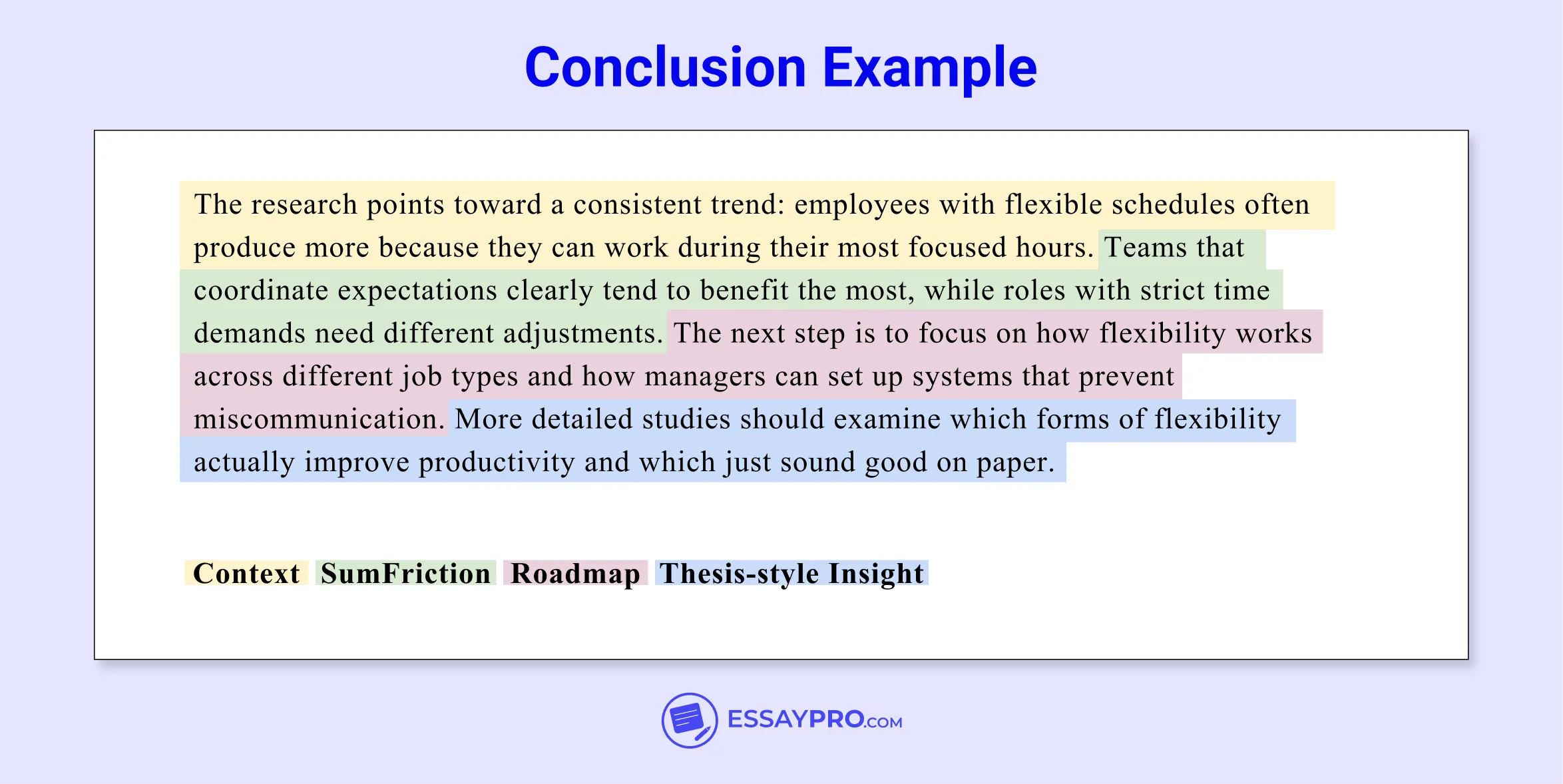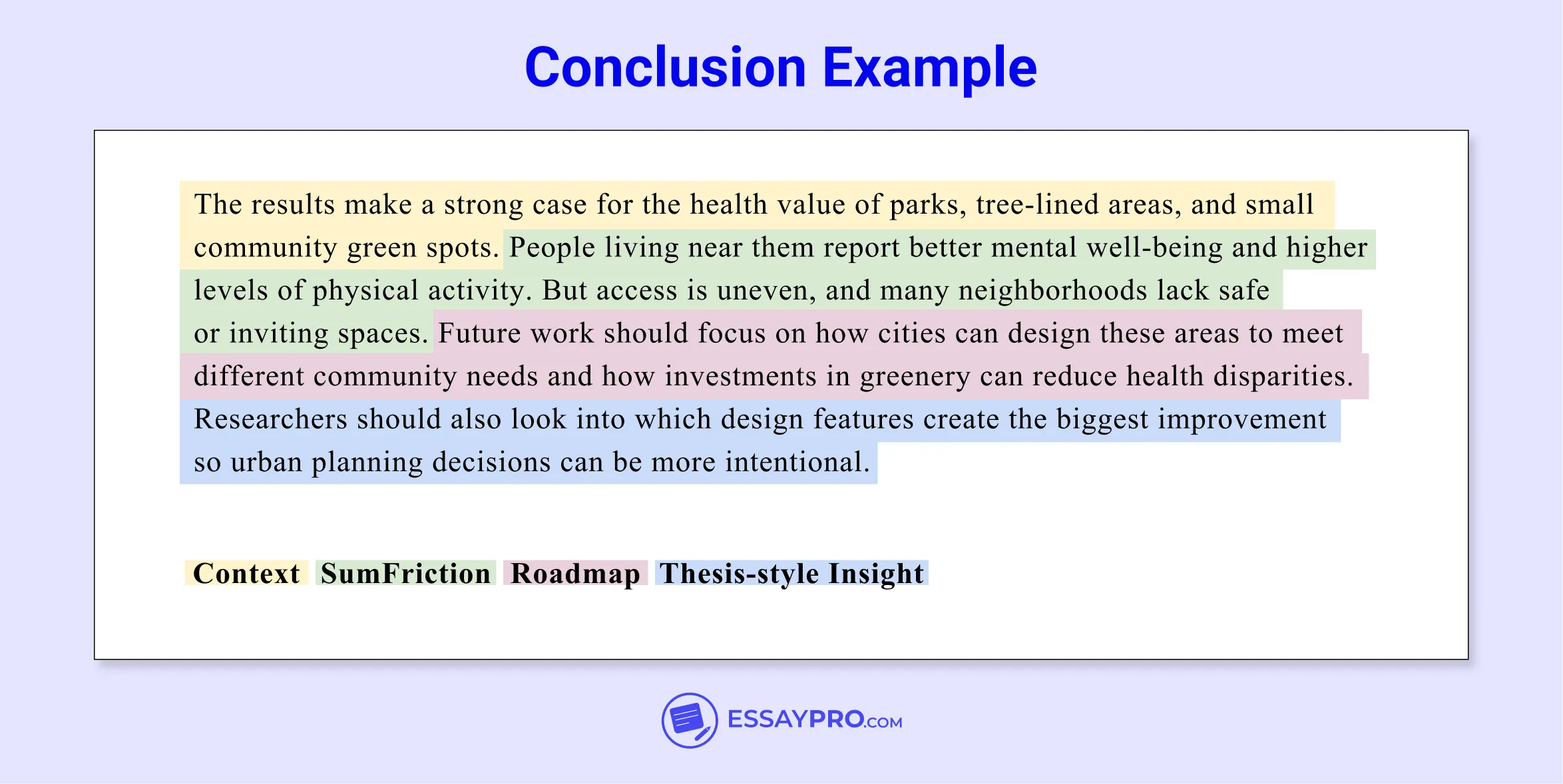A strong conclusion of a research paper brings your discussion to a clear finish and reinforces what the reader should take away. This section restates the research problem, highlights the key findings, and clarifies the main insights your work adds to the larger conversation.
The purpose of this article is to show you how to shape that final section so it feels complete, logical, and meaningful. If the writing process becomes overwhelming or the deadline feels too tight, EssayPro can support you. Simply buy a research paper and let the experts take care of it!
Need inspiration for your final paragraph? Explore how other students wrap up their research in EssayPro community.

What Is a Conclusion in a Research Paper?
A conclusion in a research paper is the part that circles back to the key findings and explains the significance of those findings in a broader context. In a strong conclusion, the writer hints at future research without speculation. It holds a middle ground between what the paper just accomplished and what the next questions might be.
Simply put, a conclusion does multiple things:
- It restates the main research question in one clean sentence.
- It gives a brief summary of the key findings.
- It explains what those findings mean or why they matter.
- It mentions what future studies could look into next.


Types of Conclusion for Research Paper
There are several common types of conclusions used in research papers. These include summary, analytical, future research, solution-focused, and reflective conclusions. Below, you will learn more about each of these types.
Summary Conclusion
The summary conclusion restates the research question and briefly reviews the main findings. This is the most common type. It’s direct and avoids interpretation. Instead, this type of conclusion focuses on the facts that the writer already presented.
Analytical Conclusion
In an analytical conclusion, a researcher explains what the results mean, why they matter, and how they connect to the wider field. This type is often characterized by connecting the current findings to previous ones.
Future Research Conclusion
This type points out limitations in the study and suggests specific areas for future research. The writer might mention limitations such as small samples, narrow focus, or gaps in existing data, and then suggest what future research should target.
Solution-Focused Conclusion
A solution-focused conclusion shows how the findings can be used in real situations, such as policy, professional practice, industry applications, or everyday decisions.
Reflective Conclusion
Writers choose a reflective conclusion when they want to explain what the study teaches us about the topic, the method, or the bigger issue behind the research. It sometimes mentions what the researcher learned during the process, but it does not become personal.
Research Paper Conclusion Outline
A research paper conclusion restates the thesis statement, summarizes the key findings, points to broader implications, acknowledges the limitations of the current research, and suggests directions for future studies. Here’s the detailed outline created by our professional essay writers:
I. Restated Thesis
Present the thesis in a revised, strengthened form.
Indicate how the research findings support the central claim.
II. Summary of Key Findings
Highlight the main results that emerged from the study.
Emphasize findings that directly address the research question.
III. Implications and Significance
Outline the broader implications of the results within the field.
Note potential consequences, applications, or contributions to existing knowledge.
IV. Limitations
Identify methodological, data-related, or scope-based constraints.
Indicate how these limitations influence the interpretation of the findings.
V. Future Research Directions
Point to areas suitable for further investigation.
List open questions that the current study brings to light.
VI. Final Closing Thought
Conclude with a statement that reinforces the main idea.
Provide a sense of closure that aligns with the overall argument.
If you need further instructions for outlining your research paper, here’s the guide: How to make a research paper outline.
How to Write a Conclusion for a Research Paper
When writing a conclusion for a research paper, the writer brings the discussion to a clear, confident finish. They restate the thesis, mention the key findings, and show what those findings mean within the larger context. The aim is to leave the reader with a lasting impression rather than offer new information.
In the following sections, we’ll walk you through the steps that lead to an effective research paper conclusion.
And if you’re just starting your research and need resources, you can use EssayPro’s research proposal writing service.
Step 1: Restate the Research Problem
This step pulls the reader back to the issue your paper set out to explore. A conclusion feels steadier when it reminds the reader of what question guided the study in the first place. Restating the research problem doesn’t mean repeating your opening line word for word. The goal is to show the same idea in a clearer form now that the full argument has unfolded.
Keep the wording simple, mention the problem, name its focus, and signal why it’s important within the topic you’ve been working with. The tone can be slightly more assured than in the introduction because you now have evidence behind you.
Example of a restated problem:
This study examined how remote work shapes employee mental health by looking at changes in stress levels and daily routines.
Step 2: Summarize the Paper
After you restate the research problem, the next step is to gather the key findings in one place. This isn’t a full replay of your entire paper. You quickly return to the ideas you already presented and once again emphasize their significance.
Aim for a short recap, mention the results that directly answer the research question, and skip anything that doesn’t connect to the core idea. You’re giving the reader a final look at the path your argument followed, without walking them through every detail again.
Example of a summary:
The results showed a steady rise in stress for employees who lacked clear work-life boundaries. Participants who created consistent routines reported more stable mental health outcomes.
Step 3: Explain the Importance of the Findings
This part of your conclusion offers a final insight. You have to show how the results fit into a broader conversation or why they are relevant to real-world scenarios.
Focus on what the findings reveal about the research problem or the field you’re writing in. If the study confirms something earlier researchers suspected, or it adds a small but meaningful piece to the existing knowledge, mention that.
Keep it grounded in your own research, not in brand new claims. You’re giving the reader a sense of direction and signaling that the work connects to something larger than the paper itself.
Example of an implication sentence for a conclusion for a research paper:
These findings suggest that early access to campus support services could reduce long-term academic stress and improve student retention rates.
Step 4: Address the 'So What?' Question
This step takes the meaning you just outlined and further develops it.Readers want to understand why your work matters beyond the immediate study. The 'So what?' moment gives them that clarity.
Answer the question: Why should anyone care about this? That answer needs to show how your findings connect to real experiences or ongoing debates. You can point to how the research changes understanding, improves a process, highlights a problem, or opens space for new questions.
Example of a 'so what?' sentence:
Understanding how social media patterns shape sleep routines gives educators and health professionals clearer ways to support teenagers who struggle with late-night screen use.
Step 5: Point Toward Future Research
A conclusion is complete when it points toward future research. This step asks you to identify questions your paper could not fully answer or areas that need deeper examination. Here, you are marking the next logical steps a researcher could take based on what you found.
For example, a study on mental health support in first-year college students might end by noting that future research could compare outcomes across different campuses or track students over several years to see long-term effects.
Suggesting future research signals that your work fits into a larger academic context, and it demonstrates to readers that the topic still holds promise for further study.
Research Paper Conclusion Examples
Below, you will find three examples of a conclusion section of a research paper. They include the following topics: the impact of remote learning on elementary school performance, how workplace flexibility affects employee productivity, and urban green spaces and their influence on public health.
The impact of remote learning on elementary school performance

This conclusion explains how remote learning affected core academic skills in elementary students. It highlights where students struggled most and identifies uneven access as a key problem. The conclusion ends with a call to action on strategies that will help students regain lost skills.
How workplace flexibility affects employee productivity

This conclusion shows that productivity often improves when employees have flexible schedules and explains why this happens. The writer suggests that more empirical research is necessary to understand how different types of flexibility influence productivity.
Urban green spaces and their influence on public health

This conclusion shows how access to parks and green areas improves physical activity and mental well-being. The author recommends future study on how cities can design fair green areas.
If you still find the process overwhelming, you can order a custom research paper through EssayPro. We’ll connect you with professionals who will take care of your paper, start to finish.
Final Thoughts
A research paper conclusion brings everything back into focus without repeating the full argument. This section is a final insight that shows why the work is important and that further research is still needed.
If you’re working on a research paper right now and want to pay someone to write a research paper, you’ve found the right place. EssayPro’s professional authors are always ready to help you submit your assignment with confidence.
FAQs
What Should the Conclusion of a Research Paper Contain?
A conclusion for a research paper should include the following: restated main argument, summarized key points, and an emphasis on the significance of those findings. An effective conclusion can also point to limitations and areas for improvement for future research.
How Long Should a Conclusion Be in a Research Paper?
Most conclusions include one to three paragraphs, depending on the length of the paper. Shorter essays need a tighter ending, while longer research projects usually require more space to summarize findings and discuss implications.
How to Start a Conclusion for a Research Paper?
Begin by reconnecting with your main research question or thesis. Use a sentence that signals the shift toward wrapping up, such as restating the core focus in clearer or more developed language.
How to Write a Good Conclusion for a Research Paper?
To write a strong conclusion, restate your thesis without repeating it word-for-word, add more nuance, bring back the key points from the body section, and explain why those findings are important in real-life scenarios.
How to End a Conclusion for a Research Paper?
The final sentence should provide a sense of closure. You can end your paper with suggestions for future research or offer one last takeaway that reflects the main purpose of your study.

Daniel Parker
is a seasoned educational writer focusing on scholarship guidance, research papers, and various forms of academic essays including reflective and narrative essays. His expertise also extends to detailed case studies. A scholar with a background in English Literature and Education, Daniel’s work on EssayPro blog aims to support students in achieving academic excellence and securing scholarships. His hobbies include reading classic literature and participating in academic forums.
- University of Southern California Libraries. (n.d.). Organizing your social sciences research paper: 9. The conclusion. https://libguides.usc.edu/writingguide/conclusion
- The Writing Center, University of North Carolina at Chapel Hill. (n.d.). Conclusions. https://writingcenter.unc.edu/tips-and-tools/conclusions/
- Ontario Institute for Studies in Education, University of Toronto. (n.d.). How to write conclusions. https://www.oise.utoronto.ca/skillshub/resources/how-write-conclusions







